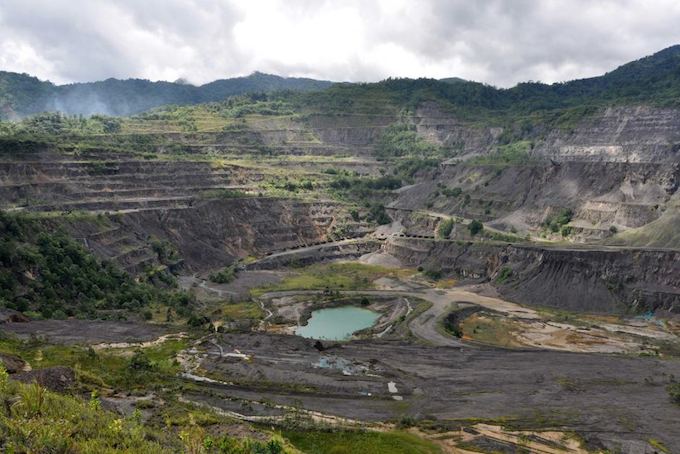
Report by Liam Cochrane in Port Moresby
The Papua New Guinea government wants to buy Rio Tinto’s shares in the Australian company Bougainville Copper Limited (BCL), according to Bougainville’s president.
Such a move would be “completely unacceptable” to Bougainvilleans and would be “potentially a source of conflict”, according to a series of leaked letters obtained by the ABC.BCL once operated the Panguna mine, which sparked a decade-long civil war in 1989 and remains a source of tension between the autonomous island of Bougainville and the PNG mainland.
Rio Tinto holds 53 percent of shares in BCL and the company still holds an exploration licence for the now-derelict mine area.
The ABC has obtained correspondence between the Autonomous Bougainville Government (ABG) President, the PNG Government and Rio Tinto regarding BCL’s future.
“I refer to the Monday 8 December discussion in Kokopo with you [PNG Prime Minister Peter O’Neill], and other ministers concerning proposals for National Government to purchase Rio Tinto’s equity in BCL,” Bougainville President John Momis wrote to O’Neill, two days after the meeting.
‘Urgent purchase’
“You emphasised a need for urgent purchase for fear Rio Tinto might otherwise sell the equity to some other entity.”
Bougainville President John Momis also voiced concerns in a separate letter to Rio Tinto’s managing director Sam Walsh.
“[PNG State Enterprises] Minister Ben Micah has advised that following a series of meetings with Rio Tinto, PNG wishes to purchase Rio’s equity in BCL and is seeking ABG agreement,” Dr Momis wrote on December 4.
It is no secret the mining giant is considering its options, launching a review of its stake in BCL in mid-2014.
On December 10, Rio Tinto’s chief development officer Craig Kinnell assured Dr Momis that no deal had been done.
“The review has not reached any final conclusions, but as you would expect Rio Tinto has engaged further with interested parties since we met earlier this year,” Kinnell wrote to Dr Momis.
The PNG government said its main priority was to rebuild Bougainville’s broken infrastructure and deliver services, but confirmed it was involved in talks about a sell-off.
‘No interest’
“There has been some discussion between the ABG, the National Government and Rio Tinto about the possible divestment of Rio Tinto’s interest in Bougainville,” O’Neill told the ABC.
“But again this is a decision on which the land owners and the people of Bougainville will have to guide the national government.
“We have no interest in owning the mine or reopening the mine.”
Dr Momis has warned O’Neill of the possible consequences of a deal that was perceived to favour the mainland.
“Given the tortured history of the Panguna mine it would be completely unacceptable to virtually all Bougainvilleans if that 53 percent equity were to be transferred to the National Government,” he said in a letter to O’Neill.
“It would be political suicide for the ABG, and potentially a source of conflict, if the ABG were to agree to the National Government becoming the majority shareholder in BCL.”
The suggestion of conflict is a serious one, considering the large number of weapons still on the island and the highly factionalised population.
Panguna mine background
The once-lucrative open cut mine has been abandoned for more than two decades and will need an estimated $8 billion to $10 billion investment to restart operations.
Some commentators, including Matt Morris, an associate with the Australian National University’s Development Policy Centre, have questioned PNG government’s interest in Panguna, given the nation’s current financial state and its poor track record managing other mines.
“I think the main questions are why does the government want to buy the mine, what is the value added that the PNG government would bring to a shareholding in BCL and thirdly what would be the political implications?” Morris told the ABC.
“The last year has been a pretty awful year for the PNG government’s finances with the collapse of the commodity prices and that’s led to rising debt levels and the PNG government’s had to cut back on expenditure for things like health and education and infrastructure.
“So it’s not really clear how the government would go about finding the funds to purchase the company or where it would find or borrow the billions of dollars that would be required to reopen the Panguna mine.”
In addition to operational costs, any restart at Panguna would have to deal with demands for compensation from locals and expectations of an environmental clean-up around the mine site.
But the potential revenue it could bring is central to Bougainville’s political future.
As part of the peace agreement that ended the civil war in 2001, Bougainville will hold a referendum on independence from PNG some time in the next five years.
Dr Momis told Bougainville’s Parliament in December that “real autonomy” would only come when the island became financially stable and that would probably mean a large-scale mining project.
“If Rio’s decision is to divest itself of the equity then the ABG’s considered view is that it is most unlikely that any potential responsible developer will be able to find the $US6 billion to $US7 billion needed to reopen the mine,” he said.
“It is therefore most unlikely the mine will reopen in the foreseeable future.”














































